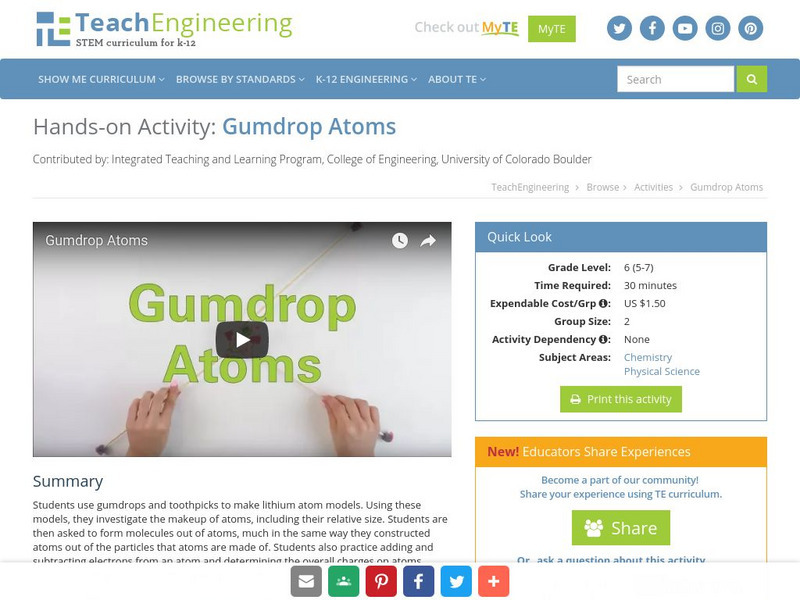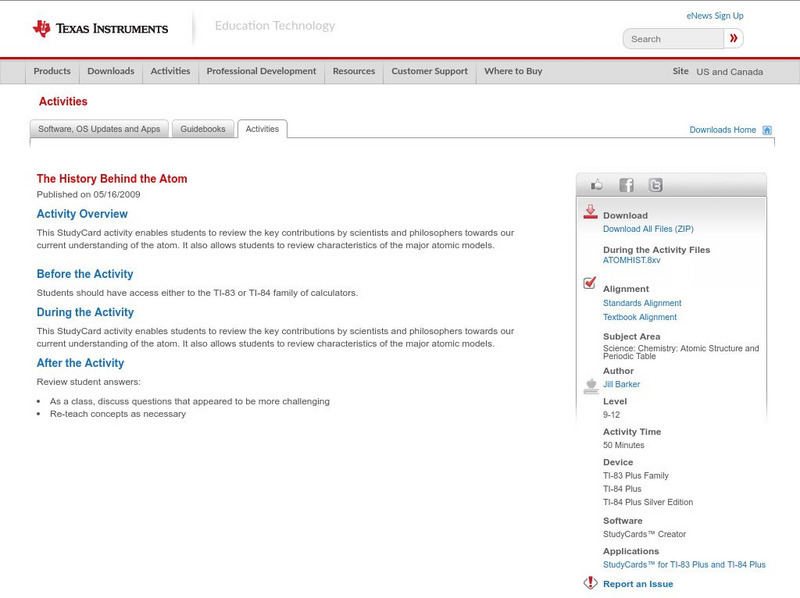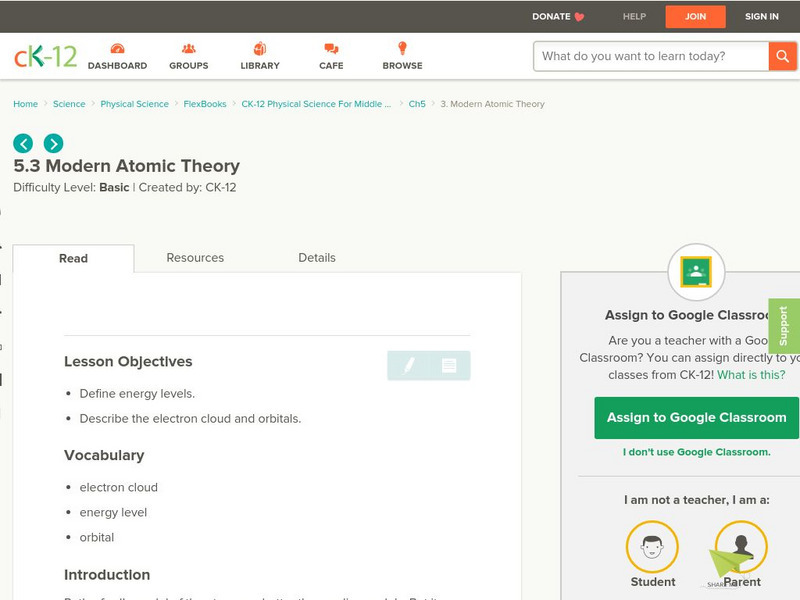Hi, what do you want to do?
Wisc-Online
Wisc Online: Lewis Dot Structures of Covalent Compounds
Short slide show provides basic information about drawing Lewis dot structures for covalent compounds. Starts with anatomy of the atom, and then shows the relationship between atomic particles and the Periodic Table of Elements. Offers...
University of Colorado
University of Colorado: Physics 2000: Bohr's Atom
An outstanding site that can best be described as student friendly. It describes the main differences between the classical and quantum models of the atom. Clear and well illustrated.
University of Colorado
University of Colorado: Ph Et Interactive Simulations: Rutherford Scattering
How did Rutherford figure out the structure of the atom without being able to see it? Simulate the famous experiment in which he disproved the Plum Pudding model of the atom by observing alpha particles bouncing off atoms and determining...
Science Struck
Science Struck: Plum Pudding Model
Describes J.J. Thomson's theory of atomic structure, called the 'Plum Pudding Model,' and how it was disproved by Ernest Rutherford.
TeachEngineering
Teach Engineering: Gumdrop Atoms
In this activity, students make a model of a lithium atom using gumdrops and toothpicks. Using this model, they investigate the makeup of an atom, including its relative size. Students also practice adding and subtracting electrons from...
Walter Fendt
Walter Fendt: Bohr's Theory of the Hydrogen Atom
An explanation of Niels Bohr's (1885 - 1962 CE) Model along with an app that illustrates a hydrogen atom according to the particle or wave model. You can choose a principal quantum number "n." The right part of the graphic represents the...
Sophia Learning
Sophia: Conservation of Mass: Lesson 2
This lesson explains the law of conservation of mass within chemical reaction with audio and quiz questions.
Science Education Resource Center at Carleton College
Serc: Tic Tac Toe Pick 3 in a Row Atomic Model Assignment
A choice menu assignment where students select between several extension activities that help understand the structure of the atom.
Texas Instruments
Texas Instruments: The History Behind the Atom
This StudyCard activity enables students to review the key contributions by scientists and philosophers towards are current understanding of the atom. It also allows students to review characteristics of the major atomic models.
Environmental Chemistry
Periodic Table of Elements: Gallium
A very detailed look at the element Gallium, a member of the Boron Group.
Science Struck
Science Struck: Explanation of John Dalton's Atomic Theory
Explains the basic tenets of Dalton's atomic theory.
American Chemical Society
Middle School Chemistry: Periodic Table and Energy Level Models
Students interpret the information given in the periodic table to describe the arrangement of electrons on the energy levels around an atom.
CK-12 Foundation
Ck 12: The Quantum Mechanical Model
[Free Registration/Login may be required to access all resource tools.] In the following online tutorial students will calculate the wavelength, frequency, and energy of light using Planck's constant and the speed of light. They will...
Thomas Jefferson National Accelerator Facility
Jefferson Lab: It's Elemental Periodic Table of Elements
This page displays the Periodic Table of Elements and allows you to click each individual element for a page that displays in-depth information about that particular element. There are also links to many different games and learning...
Curated OER
Shell Model of the Atom
Acting as a subtopic of the General Chemistry Virtual Textbook's section on Atoms and the Periodic Table, this site discusses the properties of the atoms individually in relation to the main group elements of the Periodic Table.
CK-12 Foundation
Ck 12: Physics Simulation: Atomic Colors
[Free Registration/Login Required] Explore the Bohr model of atoms by studying the absorption and emission of light from simple gases in the context of starlight using this interactive simulation. A PDF worksheet and a video tutorial are...
CK-12 Foundation
Ck 12: Modern Atomic Theory
[Free Registration/Login may be required to access all resource tools.] Rutherford's model of the atom was better than earlier models. But it wasn't the last word. Danish physicist Niels Bohr created a more accurate and useful model....
Concord Consortium
Concord Consortium: What Are Nature's Building Blocks?
Activity 3 of this module investigates: How do we know what's inside an atom? From Ernest Rutherford's Gold Foil Experiment to his investigation of the Plum Pudding model, students become aware of the Nuclear Model of an Atom. Also in...
Concord Consortium
Concord Consortium: What Are Nature's Building Blocks?
Activity 2 of the module explores: If you can't see it, how do you know it's there? Activities include the concepts of J.J. Thomson, electrons, and the Plum Pudding Model of the Atom.
Frostburg State University
General Chemistry Online: Discovery of the Electron
This site from General Chemistry Online of the Frostburg State University provides an explanation of Thomson's discovery of the electron using a cathode ray tube and also his plum cake model of the atom.
Simon Fraser University
Chem1 Virtual Textbook: Bohr's Model
Acting as a subtopic of the General Chemistry Virtual Textbook's section on Atoms and the Periodic Table, this site discusses Niels Bohr and his work with the atom. This part of the discussion, focusing on the model itself, brings up...
Simon Fraser University
Chem1 Virtual Textbook: Spectrum of the Hydrogen Atom
Acting as a subtopic of the General Chemistry Virtual Textbook's section on Atoms and the Periodic Table, this site discusses the hydrogen atom and its relation to spectrum. Included in the discussion is information on the Bohr model...
CK-12 Foundation
Ck 12: Chemistry Simulation: Rutherford's Gold Foil Experiment
[Free Registration/Login Required] How can we predict an atom's structure, if we cannot see an atom? Using the Rutherford's Gold Foil Experiment, make your own model and test out the model.
Concord Consortium
Concord Consortium: Structure of an Atom
Observe the probable location of electrons around an atom. Trace the electrons over time to draw conclusions about where electrons are likely to be found around an atom's nucleus. How does the trace pattern relate to the electron cloud...

















